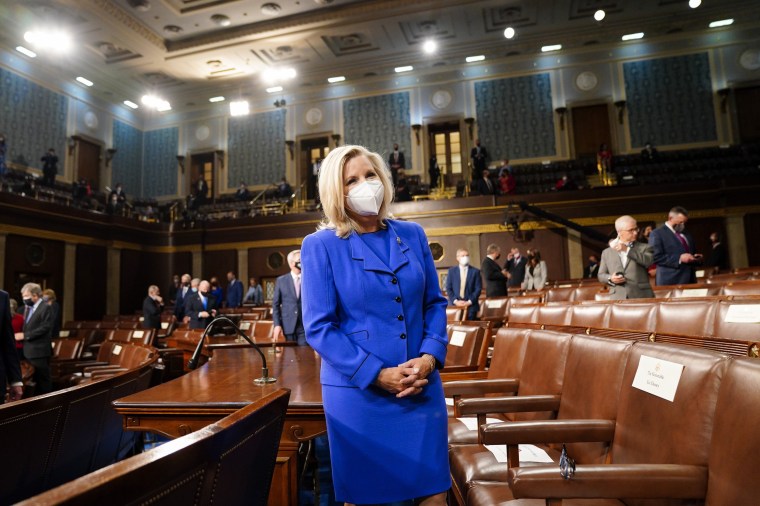WASHINGTON — Rep. Liz Cheney, R-Wyo., is about to get ousted from the House GOP leadership. Arizona Republicans are still digging through those ballots in Maricopa County. And from Georgia to Florida to Texas, GOP-controlled state legislatures are passing legislation that place restrictions on voting.
What’s more, suspects are still being arrested for the Jan. 6 attack on the Capitol. And we are just three months removed from an impeachment trial and acquittal.
The root cause of all of these events — the original sin — was an incumbent president of the United States, Donald Trump, who refused to concede an election he lost.
By more than 7 million votes. And by an Electoral College result identical to the margin he won by in 2016: 306-232.
It was a close election, but it wasn’t that close.
Had Trump simply conceded an election he lost — like John Kerry, John McCain, Mitt Romney and Hillary Clinton all did before him — none of this would be happening.
That rally and subsequent insurrection in Washington wouldn’t have taken place.
Neither would have the former president’s second impeachment trial.
Nor the voting restrictions; the hunt for bamboo fibers in Arizona; and not least of all, the No. 3 Republican in House leadership about to lose her job.
So as we try to make sense of all of these events and developments, it’s important to state it plainly: They’re all taking place because an incumbent president refused to concede an election he clearly lost.
Tweet of the day
Deal or no deal?
With President Biden set to meet with congressional leaders on Wednesday (including Mitch McConnell and Kevin McCarthy), as well as GOP senators on Thursday to discuss jobs and infrastructure, Trump’s original sin raises an important question:
Can Biden really negotiate with a party whose real leader to this day still refuses to concede he lost?
On “Meet the Press” yesterday, Sen. Bill Cassidy, R-La., said McConnell could support a deal with Biden on infrastructure.
“On infrastructure, he has made it clear. If we can find something that actually spends money on infrastructure, roads and bridges — imagine that, as opposed to what the Biden plan does which is spends a trillion on things which have no relationship to infrastructure — we can cut a deal,” Cassidy said.
Data Download: The numbers you need to know today
66 percent: The share of American adults who say they use social media at least once a day, per the latest numbers from a recent NBC News poll.
64 percent: The share of American adults who think social media platforms like Facebook and Twitter do more to divide us than bring us together, per the same poll.
36,539: The average number of daily, new coronavirus cases in the U.S. over the last seven days, per the most recent data from NBC News.
585,835: The number of deaths in the United States from the virus so far, per the most recent data from NBC News. (That’s 1,710 more than Friday morning.
31.7 percent: How many people have been fully vaccinated for Covid-19 in America
391,008: The average number of daily, new coronavirus cases in India over the last seven days, according to Johns Hopkins.
5,500 miles: The length of Colonial Pipeline Company’s system, which remains closed after last week’s cyberattack.
21 picograms: The level of the anti-inflammatory drug found in Kentucky Derby winner Medina Spirit’s blood, enough to fail a drug test that’s thrown the horse racing world into chaos.
Virginia GOP convention count enters Day 2
It’s Day 2 of the Virginia GOP counting ballots from Saturday’s unassembled, drive-through convention in picking its nominee for governor. Here’s the latest from NBC’s Deepa Shivaram:
“In Richmond, there’s a livestream accessible online of ballots being counted, and even a shared excel spreadsheet — all in effort to combat any notion of an unfair or fraudulent process. ‘We would also like to ensure all the convention delegates that their ballots will be counted fairly and accurately — leaving no room for doubt or question as to whom our nominees will be,’ the Virginia GOP chairman Rich Anderson said in a statement released Saturday.”
“Voters NBC News spoke with in Madison County, Va., had mixed reviews on the pivot to an unassembled convention rather than a primary (like the one Democrats are holding next month). Some expressed concern and how few voters were really able to participate in a convention during a pandemic, calling it ‘ridiculous’ and ‘not fair.’ Only 54,000 delegates were eligible to vote Saturday.”
“But Bill Fletcher, a voter from Rappahanock who said Pete Snyder was his top choice for governor, said, ‘I trust in the system and they'll do it. Everybody's got to present their ID and everything and I think that's a good thing. I think it should be as difficult to vote. Is it is to buy a firearm or vice-versa.’”
“Tabulating the results could go as late as Thursday, and in the meantime, state Sen. Amanda Chase is continuing to float the idea of running as an independent if she doesn’t secure the nomination.”
ICYMI: What else is happening in the world
Senate Democrats are going to revise S. 1, their sweeping elections and voting rights bill, during Tuesday’s markup.
Tens of thousands of Afghans who helped Western countries in the country want to be evacuated ahead of America’s withdrawal in fear of the Taliban.
House Minority Leader Kevin McCarthy publicly backed Rep. Elise Stefanik’s leadership bid Sunday.
The New York Times has a new look at the sexual misconduct allegations against New York Democrat Scott Stringer that have roiled the New York City mayoral race.
This Texas businessman began hawking unfounded claims of widespread electoral fraud back in 2018 before playing a central role in perpetuating the lies about the 2020 election.



